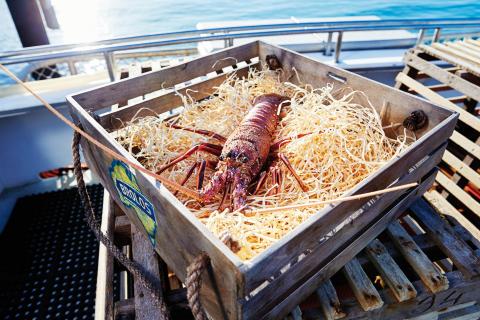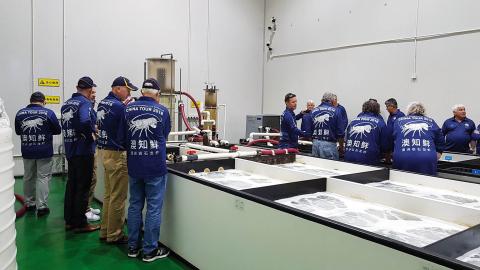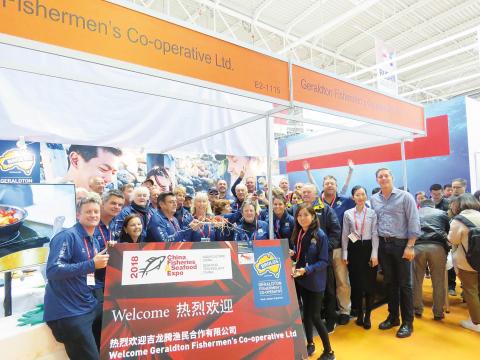Traditional importers, hotels, restaurants, wet markets and e-commerce deliveries of live rock lobsters to consumers’ homes are all part of the mix for the Geraldton Fishermen’s Co-operative’s venture into China
Story Catherine Norwood
Photos Geraldton Fishermen’s Co-operative

New markets for Western Rock Lobsters are opening in China.
To survive as a foreign business in China, particularly as a fresh food business, you need to be nimble. This sage advice is born of the experience of Matt Rutter, CEO of the Geraldton Fishermen’s Co-operative (GFC). Since establishing its own China-based business just three years ago, the GFC’s various twists and turns demonstrate how adaptable you need to be to succeed.
The co-op trades exclusively in Western Rock Lobster (Panulirus cygnus), sold under the Brolos brand. And while the Western Rock Lobster industry is “not all about China”, Matt Rutter says the country is the dominant player, and the market with the greatest opportunity for growth – at the highest prices.
“No one else in the world values rock lobster more than the Chinese,” he says. “So the majority of the product flows there naturally. It brings massive benefits back to Australia and the local economy.”
In 2018, GFC members represented 60 per cent of the commercial Western Rock Lobster quota, which equated to more than 3700 tonnes of the 6300-tonne total allowable commercial catch for the year.
Of that, about 96 per cent was exported live to China, with the remainder sent as a mix of live and frozen product to markets in Japan, Taiwan, the US, South-East Asia, the Middle East and domestic markets.
A new era


Geraldton Fishermen’s Co-operative members travelled to China last year to visit rock lobster holding facilities and explore local seafood markets.
Matt Rutter says 2018 was a ‘watershed’ year for the GFC’s trade with China.
The China–Australia Free Trade Agreement (ChAFTA), which came into effect from 2016, which progressively reduced tariffs on rock lobster from 15 per cent in 2016 to six per cent and then three per cent in 2018.
“The drop to three per cent was the tipping point and basically completely opened the doors into China,” Matt Rutter says. “It made it economical for Chinse importers to buy product direct.”
By April 2018, with a strong increase in direct sales, the GFC decided all of its sales destined for China would be sold directly to buyers in China, rather than to buyers redirecting product through other countries.
This decision has allowed the co-op to strengthen its direct marketing channels in the lead-up to the total removal of the tariff this year. It has also been able to reconfigure its distribution networks – the third such change in just three years.
First steps
The GFC first began investigating its own business opportunities in China in 2014, with ChAFTA negotiations already under way. In 2016, when the rock lobster tariff was 15 per cent, it established a foreign-invested commercial enterprise in Guangzhou.
Opening an office and a bonded warehouse allowed the GFC to hold live and frozen product effectively ‘in transit’, pre-duty and pre-customs clearance, for distribution in China or trans-shipment to other markets.
Cross-border trade had some benefits, including lower tariffs. But, as the Chinese tariff reduced, the advantages of the bonded warehouse diminished. So in 2017, the GFC closed the bonded warehouse and opened new holding facilities in Guangzhou, Beijing and Shanghai. At these facilities, the product was cleared and ready for immediate sale, with distribution centres in each city.
“This strategy was initially built around e-commerce, delivering live rock lobsters to consumers’ homes,” Matt Rutter says.
“We had facilities within the SF Express cold-chain warehouses, and we could pack rock lobsters direct into retail packaging and send it to homes within five to 10 hours of being packed. E-commerce is a really rapidly growing market in China and we wanted to explore that.”
Exploring other markets
While e-commerce has not been as successful as the GFC had hoped, due to the expensive nature of the product, Matt Rutter says the process did help to establish “a footprint”, with live holding facilities in three cities. And this gave the co-op the opportunity to explore other markets as well.
“As free trade has kicked in, we have started to explore delivering direct to businesses, rather than to customers – B2B rather than B2C,” he says. “We’re finding the opportunities in this B2B market are larger than those in the B2C market. So we’ve evolved again to better service those business markets, although we are continuing with the Chinese customer e-commerce site.”
As 2019 kicks off, Australian rock lobster imports are officially tariff free in China, and the GFC is relocating its Guangzhou and Shanghai holding facilities closer to wet markets and businesses. It will suspend the Beijing warehouse for the time being, servicing that market via Shanghai and Guangzhou instead.
The larger hub in Guangzhou will take advantage of the GFC’s holding facilities adjacent to Perth airport and direct flights to Guangzhou.
“We can use Guangzhou as a distribution centre into the rest of China, which will give us some economies of scale,” Matt Rutter says. “The Shanghai hub will move into one of the wet markets.”
The GFC’s rock lobster holding pens have been designed to be highly mobile – they can be simply loaded onto the back of a truck and moved to a new location. Matt Rutter says this design reflects the continual evolution of operations in China and the speed of change. “You need to be nimble so that you can evolve as you learn more about the market, and it is a highly complex market,” he says.
A multiplicity of markets
In fact, Matt Rutter adds, China is not one market, but hundreds. The country has at least 15 cities with a population of 10 million or more, and 100 cities with a population of around one million. And in each of these cities, the demand for rock lobster is shaped by different factors, including preferred size and cultural dining traditions. In inland cities such as Chengdu (population 7.8 million) in Sichuan province, known for its spicy foods, the experience of rock lobster is almost entirely new.
The development of China’s sophisticated cool-chain logistics over the past five years has allowed seafood to safely travel further, creating new market opportunities.
Matt Rutter says having its own facilities also allows the GFC to diversify its supply options for buyers. Large importers can use traditional ‘carriage paid to’ terms, taking responsibility for the product from the point of departure from Australia. Others, particularly smaller buyers, can use ‘delivered duty paid’ arrangements and opt to buy direct from the GFC’s facilities in China, collect it from the destination airport, or have it delivered directly to their doorstep.
An increasing demand
According to Matt Rutter, it has always proven difficult to quantify the return on the investment in China because so many variables influence the price of a fresh food product such as rock lobster.
These could include anything from the volumes caught in Australia on any one day, to whether it is a lucky year to get married in China.
“But there is increased demand for the product and we have opened new markets,” he says.
“We are servicing twice the number of customers that we were 12 months ago, and many of those customers are further down the supply chain, so we are capturing a larger share of the final price.
And we are only selling to the highest paying customers, so we are confident we have a higher baseline price for our product, although peak prices remain highly volatile.
“2018 has been a huge year for us. But we have to remain nimble, to remain open to market opportunities and to be constantly watching the trends in China. Because if you can’t change quickly in response to those things, then you will quickly become redundant.”
Matt Rutter will speak about the Geraldton Fishermen’s Co-operative’s market journey in China at the 2019 Australian Bureau of Resource Economics and Sciences Outlook Conference in Canberra on 5–6 March, 2019.
More information
Matthew Rutter
mattr@brolos.com.au





